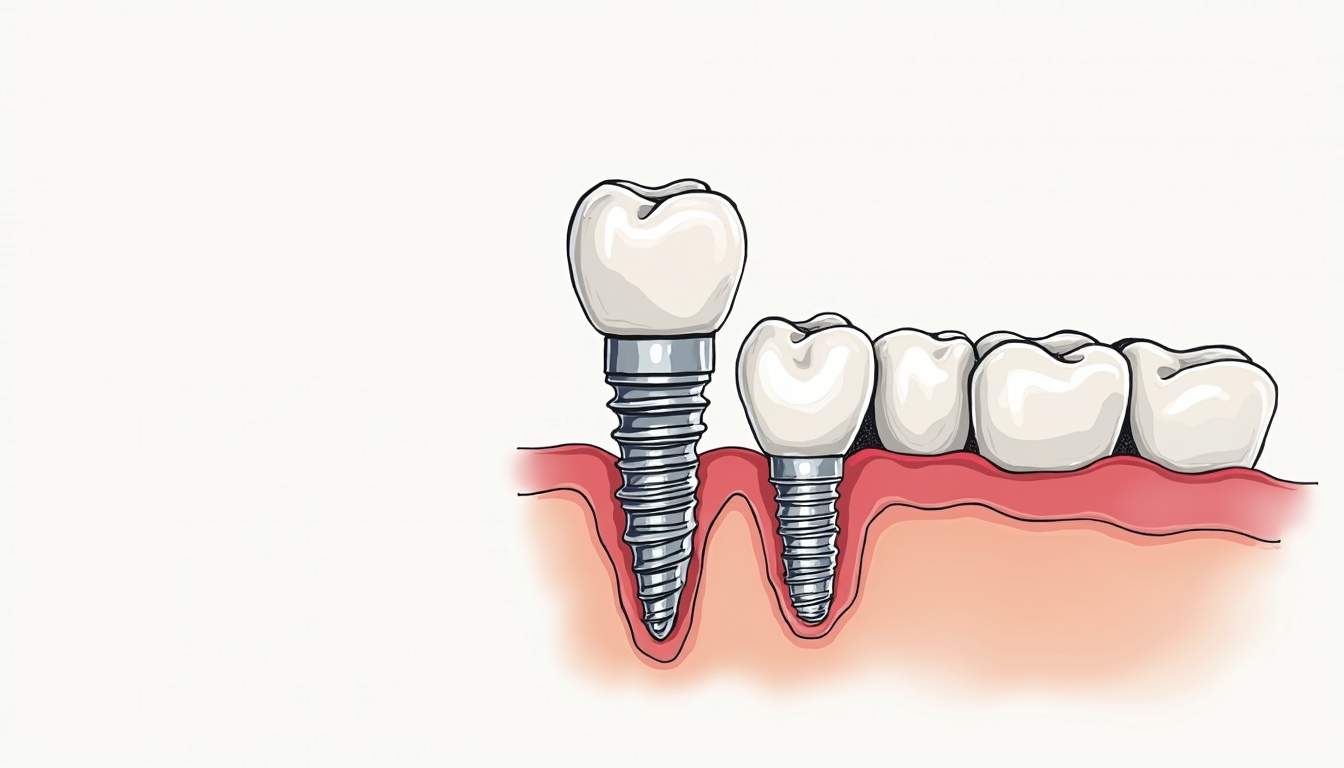Dental implants have revolutionised the way missing teeth are replaced, offering a durable and aesthetically pleasing solution for those seeking to restore their smiles. Here, the Aventis Dental team explore the intricacies of dental implant treatments, covering everything from the procedure to aftercare, ensuring that you have a comprehensive understanding of what to expect.
Dental implants are artificial tooth roots made of biocompatible materials, typically titanium, which are surgically inserted into the jawbone. Once healed, these implants serve as a sturdy foundation for replacement teeth, such as crowns, bridges, or dentures. Unlike traditional dentures or bridges, dental implants provide a more permanent solution that mimics the function and appearance of natural teeth. Their design allows for a secure fit, enabling you to eat, speak, and smile with confidence, without the fear of slippage that can accompany removable dental appliances.
In addition to their functional benefits, dental implants can significantly enhance a person’s self-esteem. Many individuals who have lost teeth may feel self-conscious about their smile, leading to social withdrawal or discomfort in public settings. By restoring the natural look and feel of teeth, dental implants can help you regain your confidence and improve tyour overall quality of life. The procedure has become increasingly popular, with advancements in technology making it more accessible and efficient than ever before.
There are primarily two types of dental implants: endosteal and subperiosteal. Endosteal implants are the most common and are placed directly into the jawbone. They can hold one or more prosthetic teeth. Subperiosteal implants, on the other hand, are placed under the gum but above the jawbone, making them suitable for patients who may not have sufficient bone height for endosteal implants. Each type of implant has its specific indications and is chosen based on the individual needs of the patient, including their oral health, bone density, and personal preferences.
Moreover, within the category of endosteal implants, there are various designs and surface treatments that can enhance osseointegration—the process by which the implant fuses with the jawbone. Some implants feature roughened surfaces or coatings that promote better bone attachment, while others may be designed in different shapes to accommodate various anatomical considerations. This diversity allows dental professionals to tailor their approach to each patient’s unique situation, ensuring optimal outcomes and longevity of the implants.
One of the most significant advantages of dental implants is their longevity. With proper care, they can last a lifetime, making them a cost-effective solution in the long run. Additionally, they help preserve jawbone health by preventing bone loss that often occurs with missing teeth. This preservation contributes to a more youthful facial appearance. Unlike traditional dental solutions, which may require replacement or adjustment over time, dental implants provide a stable and enduring option that integrates seamlessly into the patient’s oral anatomy.
Furthermore, dental implants can improve oral hygiene. Unlike bridges, which require alteration of adjacent teeth, implants do not affect neighboring teeth and can be cleaned just like natural teeth. This ease of maintenance encourages better oral hygiene practices, reducing the risk of gum disease and other dental issues. Patients with implants often report a higher satisfaction level with their dental care, as they can enjoy a diet that includes a wider variety of foods without restrictions, ultimately leading to a healthier lifestyle.
The dental implant process typically involves several stages, beginning with a thorough examination and consultation. This initial step is crucial to determine the best treatment plan tailored to the patient’s specific needs.
During the consultation, the dentist will evaluate the patient’s oral health, take X-rays, and possibly create a 3D model of the jaw. This detailed planning phase ensures that the implant is placed in the optimal position for both functionality and aesthetics.
The surgical procedure involves placing the implant into the jawbone. This is usually done under local anesthesia, and in some cases, sedation may be offered for anxious patients. After the implant is placed, a healing period of several months is necessary for osseointegration, where the bone grows around the implant, securing it firmly in place.
Once the implant has integrated with the bone, an abutment is attached to the implant. This small connector serves as a base for the crown, which is the visible part of the tooth. After the gums have healed around the abutment, a custom-made crown is fitted, completing the restoration process.
Post-operative care is essential for the success of dental implants. Patients can expect some swelling and discomfort following the surgery, which can typically be managed with prescribed pain medication and ice packs. Following the dentist’s aftercare instructions is crucial to ensure proper healing. At Aventis Dental Clinic you’ll be superbly looked after every step of the way.

During the initial recovery phase, a soft diet is recommended to avoid putting pressure on the implant site. Foods like yogurt, smoothies, and soups can provide necessary nutrition without causing discomfort. Gradually, as healing progresses, patients can reintroduce solid foods into their diet.
Maintaining excellent oral hygiene is vital for the longevity of dental implants. Patients should brush and floss regularly, just as they would with natural teeth. Additionally, regular dental check-ups are crucial to monitor the health of the implant and surrounding tissues.
While dental implants are generally safe and effective, like any surgical procedure, they come with potential risks. Understanding these risks can help patients make informed decisions about their dental health.
Some common complications include infection at the implant site, nerve damage, or sinus issues if the implant is placed in the upper jaw. These complications are rare but can occur, particularly if proper aftercare is not followed.
Over time, factors such as gum disease or bone loss can affect the integrity of the implant. Regular dental visits will help in early detection and management of any potential issues, ensuring the longevity of the implant.
The cost of dental implants can vary significantly based on several factors, including the number of implants needed, the complexity of the case, and geographical location. Generally, dental implants are more expensive than traditional dentures or bridges, but their durability and functionality often justify the investment.
Many dental insurance plans do not cover the full cost of dental implants, viewing them as a cosmetic procedure. However, some plans may offer partial coverage, especially if the implants are deemed medically necessary. It’s advisable for patients to check with their insurance provider to understand their benefits.
For those concerned about the cost, ask us about financing options to make dental implants more accessible. Payment plans can spread the cost over time, allowing patients to receive the treatment they need without financial strain.
Selecting a qualified and experienced dentist is crucial for the success of dental implant treatments. Patients should look for a dentist who specialises in implant dentistry and has a proven track record of successful procedures. Here at Aventis, our implant specialist Dr Grewal is extremely experienced in all aspects of dental implant surgical treatment.
Before committing to a dental implant procedure, it’s essential to ask the right questions. Inquire about the dentist’s experience with implants, the technology used, and the expected timeline for the procedure. Understanding the process and what to expect can alleviate anxiety and build trust in the chosen provider.
Reading patient reviews and testimonials can provide valuable insight into the dentist’s practice. Positive feedback from previous patients can indicate a high level of care and satisfaction, while negative reviews may raise red flags. Taking the time to research can lead to a more informed decision.
While dental implants are an excellent option for many, they may not be suitable for everyone. Understanding alternative treatments can help patients make the best choice for their dental health.
Dental bridges are a common alternative to implants. They consist of one or more artificial teeth anchored to adjacent natural teeth. While bridges can effectively restore functionality and aesthetics, they do not prevent bone loss in the jaw, which can lead to further dental issues over time.
For patients with multiple missing teeth, partial or full dentures may be recommended. These removable appliances can restore the appearance of a full smile, but they often require adjustments and may not provide the same level of stability as dental implants.
Dental implants offer a reliable and aesthetically pleasing solution for those with missing teeth. With a comprehensive understanding of the procedure, benefits, and aftercare, patients can make informed decisions about their dental health. Whether considering implants or exploring alternatives, consulting with a qualified dental professional is essential to achieving the best outcome.
Ultimately, investing in dental implants can lead to improved oral health, enhanced confidence, and a restored smile that lasts a lifetime. With the right care and maintenance, dental implants can significantly impact one’s quality of life, making them a worthwhile consideration for anyone facing tooth loss.
Back to Blog